Posted January 21, 2018 by Nicky in Reviews / 0 Comments
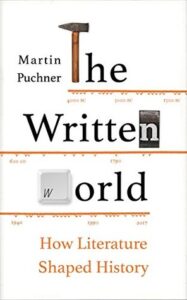 The Written World, Martin Puchner
The Written World, Martin Puchner
I’ve seen some complaints about the historical accuracy of this, particularly in regard to the earliest sections, but I’m unable to judge because it’s not really my area of history at all — inasfar as I know my history anyway, which is often patchy. I simply enjoyed The Written World as a summary, from one perspective, of how some stories and books have changed the world in being written (or in the case of previously oral works, written down). Puchner writes compellingly about books I haven’t read yet, and really makes them sound tempting — The Tale of Genji, for example (though he also makes Don Quixote sound fascinating, and I did not love that at all).
It’s not the be-all and end-all, but if you love books and you want to read about some books that have been important in shaping society, then this should be right up your street (up your bookshelf?).
Rating: 4/5
Tags: book reviews, books, history, non-fiction
Posted January 20, 2018 by Nicky in Reviews / 0 Comments
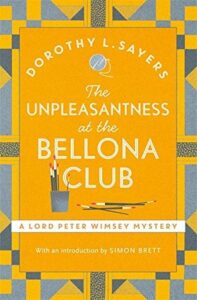 The Unpleasantness at the Bellona Club, Dorothy L. Sayers
The Unpleasantness at the Bellona Club, Dorothy L. Sayers
A reread, of course. Not the best of the Wimsey books, but full of Sayers’ usual brains and wit. There’s some excellent character interactions — especially one between Lord Peter and Parker, where Peter is somewhat resenting the fact that he’s working with the police and potentially having to betray friends. There’s some great quotes, like Peter saying that books are kind of like shells that we discard when we grow out of them, but which lie around as a record of people we used to be. Yes!
This is one of the not-really-high-stakes mysteries, though; the death was of an old man, and was somewhat predictable, and the person who killed him didn’t try to cover his tracks by attacking other people. It becomes more of an intellectual puzzle, though there are some good bits about the feelings of particular characters. I don’t want to say too much in case anyone’s interested in reading this and forming their own opinions about the murder, so I’ll stop there! A solid mystery, but not the most emotionally involving of the Wimsey books, nor the cleverest.
Rating: 4/5
Tags: book reviews, books, crime, Dorothy L. Sayers, mystery
Posted January 20, 2018 by Nicky in General / 6 Comments
Good morning, folks! It’s been a slow reading week for me, with one really disappointing book, but I’ve got an assignment done and I’ve been doing quite a bit of work, so that’s not bad!
Received to review:
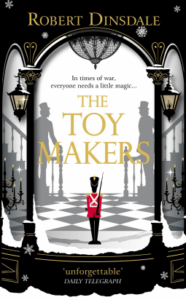
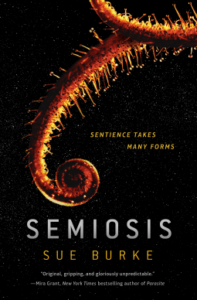
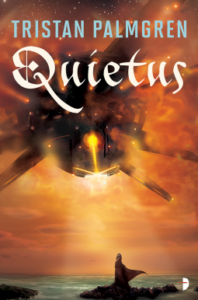
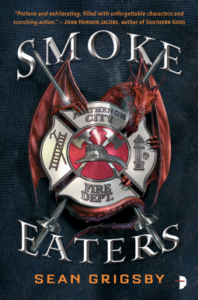
I really should stop requesting until I’m all caught up, but it was so tempting…
Read this week:
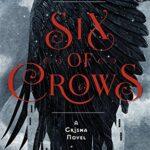
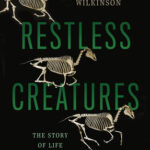
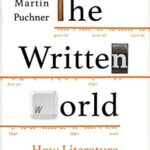
Four stars: Six of Crows, The Written World.
Two stars: Restless Creatures.
Reviewed this week:
–The Power of Babel, by John McWhorter. Surprised me somewhat, since it contradicted some of the stuff I’d always read about languages, e.g. that only children turn pidgins into creoles where they become actual full languages. 3/5 stars
–Arabella of Mars, by David D. Levine. So much fun, and a really quick read. Like a classic adventure story. 4/5 stars
–Unnatural Death, by Dorothy L. Sayers. The motive and method are just so clever in this one. 4/5 stars
–Priam’s Gold, by Caroline Moorehead. More of a biography of Heinrich Schliemann than really being about Troy, though there is some interesting stuff on when the Russians looted the treasure from Germany. 4/5 stars
–The Goblin Emperor, by Katherine Addison. I reread it again, so no surprise that I loved it again. 5/5 stars
–Lumberjanes to the Max: Volume 1, by Noelle Stephenson et al. So much fun, and really cute too. 5/5 stars
–Fossils: The Key to the Past, by Richard Fortey. Not Fortey’s most fascinating work in terms of the prose, but all the colour photography and reconstructions make it worth having just to look at! 4/5 stars
Other posts:
–Top Ten Tuesday. My bookish resolutions for 2018!
–WWW Wednesday. The latest on my TBR pile.
How’s everyone doing? Good week, bad week, somewhere in the middle?
Tags: books, Stacking the Shelves, weekly roundup
Posted January 19, 2018 by Nicky in Reviews / 0 Comments
 Fossils: The Key to the Past, Richard Fortey
Fossils: The Key to the Past, Richard Fortey
This is probably more of a reference book than one to read straight through; it’s beautifully illustrated with sketches and photographs reproducing common and interesting fossils, and it has advice on how to identify fossils, clean them up and store them, along with the relatively straightforward explanations of how fossils form, how they can be useful, and specific titbits on various different individual fossils.
The information wasn’t new to me, and it isn’t Fortey’s finest writing, though he can always make geology sound fascinating. It’s a beautiful book, though, and one I’ll definitely keep for reference.
Rating: 4/5
Tags: book reviews, books, non-fiction
Posted January 18, 2018 by Nicky in Reviews / 4 Comments
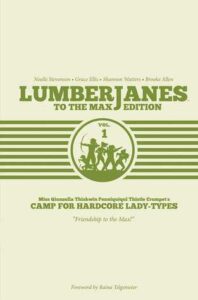 Lumberjanes to the Max: Volume 1, Noelle Stephenson, Grace Ellis, Shannon Watters, Brooke Allen
Lumberjanes to the Max: Volume 1, Noelle Stephenson, Grace Ellis, Shannon Watters, Brooke Allen
Lumberjanes is really fun and really cute. The art is very typically Stephenson’s style, very much like Nimona, which I rather enjoy — it manages to be expressive and dynamic without appearing painstakingly polished. I enjoy the character designs a lot, perhaps especially Mal and April, and Ripley is just tons of fun. It’s meant for a younger audience, mostly, but I think it can appeal on other levels as well, especially with the puns and references — not many kids are going to understand why Jen (I think it was Jen) shouts, “By bell hooks!”
It’s pretty much all about ladies, and that’s pretty darn badass. There’s an adorkable crush between Mal and Molly, and the whole thing is about the friendship between the girls and how it helps them with everything that’s going on at the camp.
Which also involves magic and Greek mythology, no kidding.
I really enjoyed it, in an uncomplicated and delighted way.
Rating: 5/5
Tags: book reviews, books, comics
Posted January 17, 2018 by Nicky in Reviews / 2 Comments
 The Goblin Emperor, Katherine Addison
The Goblin Emperor, Katherine Addison
Another reread, still a favourite. It’s like a hot bath after a long day, because the main character is a good person — not someone without faults, but someone who is aware that he has faults and that he has human feelings, and tries to be mindful and generous despite suddenly gaining power over people who have harmed him. It’s not really about conflict — although there are several serious ones — or about any particular endgame. Maia just wants to be a good person, and to rule his people well. He hardly considers turning away from the responsibility, even though it is unasked and unwanted and he’s totally unprepared. It has to be him, so he does it.
And he does a good job. That might be the most unrealistic thing about it, but it’s just difficult enough and involves just enough of building a support network that it works for me. I love the characters around Maia and how they help him, and how they all gradually warm to him or, in some cases, not — and why they warm to him, or not.
I also love the thought that goes into the complexities of the language, including the non-verbal language involving their ear positions. I don’t always follow the patterns, but it seems consistent and commensurate with long-existing languages. It’s a secondary world Tolkien would find a fascinating start toward building a rich and complete world, I do believe.
Rating: 5/5
Tags: book reviews, books, SF/F
Posted January 17, 2018 by Nicky in General / 4 Comments
The three ‘W’s are what are you reading now, what have you recently finished reading, and what are you going to read next, and you can find this week’s post at the host’s blog here if you want to check out other posts.
What are you currently reading?
 Restless Creatures, by Matt Wilkinson. It’s evolutionary biology focused on the importance of locomotion in selection, and in theory it should be right up my alley… in practice, I just kind of want to have finished it. It’s not bad and I don’t feel like it’d be fair to drop it… but it’s mostly either principles I’m not interested in (physics of motion), principles I know extremely well already (homology in HOX genes), or principles I both know well and am not interested in (physics of flight; blame my years as an RAF cadet).
Restless Creatures, by Matt Wilkinson. It’s evolutionary biology focused on the importance of locomotion in selection, and in theory it should be right up my alley… in practice, I just kind of want to have finished it. It’s not bad and I don’t feel like it’d be fair to drop it… but it’s mostly either principles I’m not interested in (physics of motion), principles I know extremely well already (homology in HOX genes), or principles I both know well and am not interested in (physics of flight; blame my years as an RAF cadet).
What have you recently finished reading?
 Six of Crows, by Leigh Bardugo. I found it a really quick read, and I’m pretty into some of the character dynamics… though I have some reservations about how some things are going to turn out. It’s a lot of fun, anyway, and I’m glad I picked it for this month’s book club read on Habitica.
Six of Crows, by Leigh Bardugo. I found it a really quick read, and I’m pretty into some of the character dynamics… though I have some reservations about how some things are going to turn out. It’s a lot of fun, anyway, and I’m glad I picked it for this month’s book club read on Habitica.
What will you be reading next?
 Apart from the follow-up to Six of Crows, I want to knuckle down and actually finish my reread of Kushiel’s Dart — I think I only stalled because I was busy at the time, and I’m about to hand in an assignment and have at least a few days’ breathing space. Other than that, from my ‘sell me a book’ post, I want to pick up Mary Robinette Kowal’s Ghost Talkers.
Apart from the follow-up to Six of Crows, I want to knuckle down and actually finish my reread of Kushiel’s Dart — I think I only stalled because I was busy at the time, and I’m about to hand in an assignment and have at least a few days’ breathing space. Other than that, from my ‘sell me a book’ post, I want to pick up Mary Robinette Kowal’s Ghost Talkers.
What about you? What’re you reading?
Tags: books, WWW Wednesday
Posted January 16, 2018 by Nicky in General / 12 Comments
Top Ten Tuesday has moved homes! You can now find it at That Artsy Reader Girl‘s blog. Since I did want to post something about this topic — “bookish resolutions/goals” — I thought I’d join in again, at least for this week!

- Read for joy. I still keep on reading books I think I “ought” to read, or picking up something from my backlog just because I was interested in it once and I no longer am. There’s space for that, when it’s a topic I want to learn about or something I’d like to comment on, but this year my resolution is definitely to read primarily for joy.
- Write reviews within 24 hours of finishing the book. I used to do this, and then I fell into bad habits. No more writing of vague reviews because the book didn’t leave much of an impression and it’s been three weeks…
- Keep up my practice of commenting on at least one other blog per day. I’ve been doing this almost every day for two years now, and it might not be ideal for my reading list — argh, so many books I want — but it’s a great way to keep in touch with other bloggers.
- Earn my book purchases. Me and my wife have a system we call “Adulting: The Game”. We get stars for stuff we do towards various goals like keeping up with chores, eating more healthily, keeping up with class, taking care of our finances… I get to buy one book per twenty stars I earn. (But it’s okay for me to use Amazon vouchers, etc; that counts as gifts.)
- Read from my backlog. Last year’s goal was 200, and I didn’t make it. This year… we’ll see. But I’m doing well so far, with eight of the ten books I’ve read being from my backlog.
- Catch up with ARCs. I’m going to try to stop looking at Netgalley and requesting stuff. Of course, that’s partly fuelled by the fact that I can only “wish for” books from a lot of publishers on Netgalley now, but it’s also because I have one heckuva backlog there.
- Give up on Goodreads. I used Goodreads to catalogue my books for years, but now I’m just using it as a way to get some book recommendations from reviewers I’ve known for years and to post my own reviews for them. Gone are the days of making any obsessive searches to get all my lists to agree.
- Reread when I want. This kind of goes with “read for joy” — I love to reread, but I haven’t been doing it as much as I’d like because I feel like I should only be providing “fresh” content for my readers. Pffft, half the time people don’t even know that I’ve posted a review for a particular book before; there’s no drop in interest for my reviews of books I’ve reread. I think enthusiasm is more valuable to readers anyway.
- Go to bed a little earlier than necessary to get in some time to read. Or, as me and my wife put it, “bookbed”. We did that a lot before Christmas, and it was nice. Time to resurrect it, if only because it’s entertaining to watch Lisa gasp and cuss as she reads James S.A. Corey’s books.
- Read things that scare me. Whether that’s reading books about bugs, physics that turns my brain inside out, or just massive fantasy tomes that would squash my bunnies flat if I dropped them, it’s always good to challenge yourself. There’s a big place for comfort and familiarity in my reading repertoire, but it’s also important to step into the unknown.
So what’re your resolutions?
Tags: books, Top Ten Tuesday
Posted January 16, 2018 by Nicky in Reviews / 0 Comments
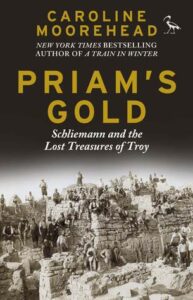 Priam’s Gold, Caroline Moorehead
Priam’s Gold, Caroline Moorehead
This book is actually more of a biography of Heinrich Schliemann than a discussion of the excavations at Troy; although it does follow “Priam’s Treasure” and what has happened to it since Schliemann excavated it, including commentary on the politics that surrounded its loss and (eventual) subsequent retrieval, the main focus is Schliemann, his life, and his work as an archaeologist. There’s a lot of it taken up with Schliemann’s life before he found Troy, and a fair amount of time spent on evaluating the truth of his account of the excavation and indeed other aspects of his life.
There is some discussion of Troy and specifically the treasure found there, and there are some insights to other excavations led by Schliemann, but if you’re looking for an archaeology book, this isn’t quite it. There’s a lot more time spent on what languages Schliemann could speak and his relationships with his wives than on actual archaeology. It’s interesting, but not entirely what I hoped for.
Rating: 3/5
Tags: book reviews, books, history, non-fiction
Posted January 15, 2018 by Nicky in Reviews / 0 Comments
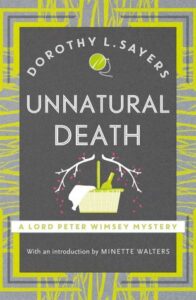 Unnatural Death, Dorothy L. Sayers
Unnatural Death, Dorothy L. Sayers
It’s fun approaching these books now I’ve introduced my wife to them, via the radioplays and Edward Petherbridge TV series. (I think most of my gifts from her this year have been Wimsey themed… a bunch of the new editions of the books for my birthday, and then the Petherbridge series on DVD for Christmas!) It gives me a bit of a fresh eye to appreciate things all over again; the wittiness of Sayers’ writing, the cleverness of the plot, the way the characters all work together. Miss Climpson is a delight, up to and including the wry observations on how she’s actually rather nosy, despite saying she’s not. Parker is the perfect partner for Peter when investigating, willing to put in the hard graft which Peter is constitutionally unsuited for. And Bunter… well. I don’t know what Peter would do without him.
The murder/mystery part is rather fun, because it has two key problems: there’s no discernible motive, and there’s no discernible method. Peter has to track down both, and without saying too much, the legal problem on which the plot hangs is rather clever once you work it out, though infuriating while you’re trying to get there. The murder method… well. Embarrassingly simple, but just sneaky enough that it’s difficult to prove.
It’s not my favourite of Sayers’ books, but it’s witty, cleverly written, and definitely worth spending time with.
Rating: 4/5
Tags: book reviews, books, crime, Dorothy L. Sayers, mystery
 The Written World, Martin Puchner
The Written World, Martin Puchner














